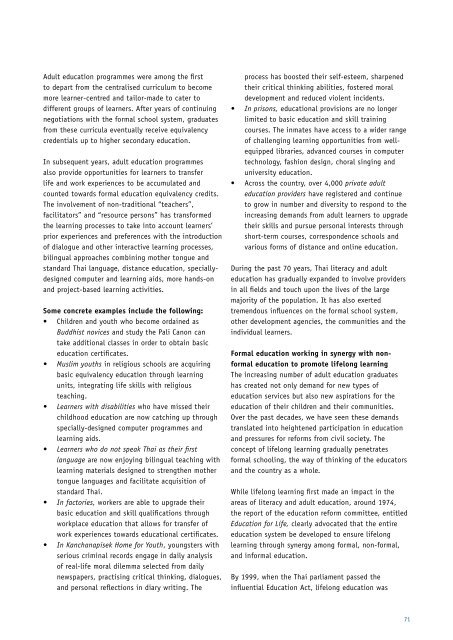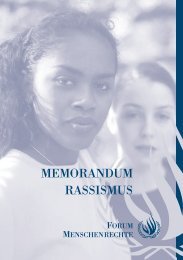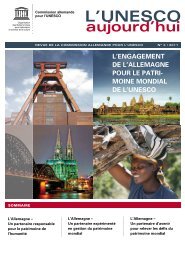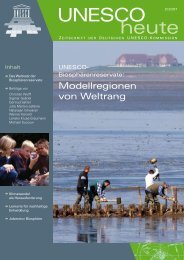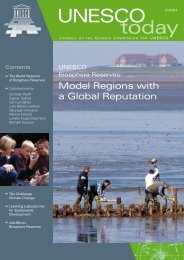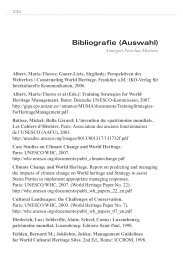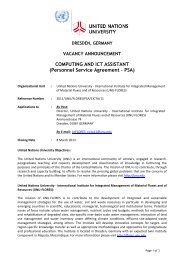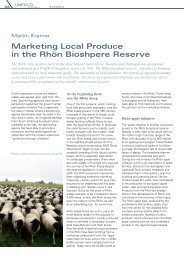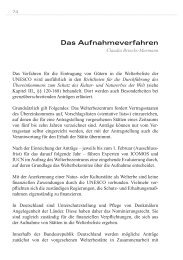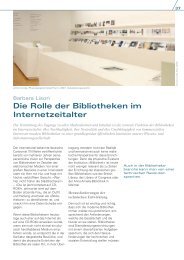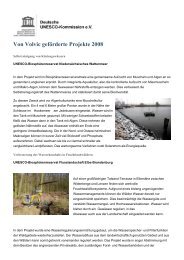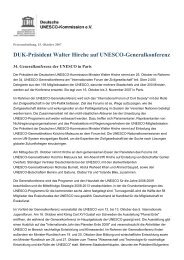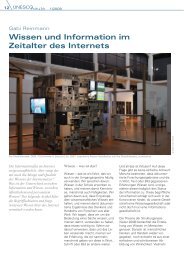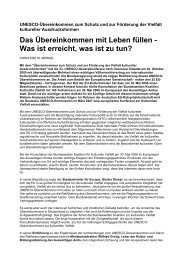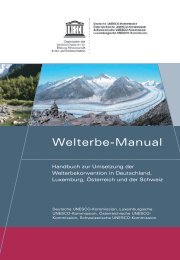CONFINTEA VI, final report - Unesco
CONFINTEA VI, final report - Unesco
CONFINTEA VI, final report - Unesco
Create successful ePaper yourself
Turn your PDF publications into a flip-book with our unique Google optimized e-Paper software.
Adult education programmes were among the first<br />
to depart from the centralised curriculum to become<br />
more learner-centred and tailor-made to cater to<br />
different groups of learners. After years of continuing<br />
negotiations with the formal school system, graduates<br />
from these curricula eventually receive equivalency<br />
credentials up to higher secondary education.<br />
In subsequent years, adult education programmes<br />
also provide opportunities for learners to transfer<br />
life and work experiences to be accumulated and<br />
counted towards formal education equivalency credits.<br />
The involvement of non-traditional “teachers”,<br />
facilitators” and “resource persons” has transformed<br />
the learning processes to take into account learners’<br />
prior experiences and preferences with the introduction<br />
of dialogue and other interactive learning processes,<br />
bilingual approaches combining mother tongue and<br />
standard Thai language, distance education, speciallydesigned<br />
computer and learning aids, more hands-on<br />
and project-based learning activities.<br />
Some concrete examples include the following:<br />
• Children and youth who become ordained as<br />
Buddhist novices and study the Pali Canon can<br />
take additional classes in order to obtain basic<br />
education certificates.<br />
• Muslim youths in religious schools are acquiring<br />
basic equivalency education through learning<br />
units, integrating life skills with religious<br />
teaching.<br />
• Learners with disabilities who have missed their<br />
childhood education are now catching up through<br />
specially-designed computer programmes and<br />
learning aids.<br />
• Learners who do not speak Thai as their first<br />
language are now enjoying bilingual teaching with<br />
learning materials designed to strengthen mother<br />
tongue languages and facilitate acquisition of<br />
standard Thai.<br />
• In factories, workers are able to upgrade their<br />
basic education and skill qualifications through<br />
workplace education that allows for transfer of<br />
work experiences towards educational certificates.<br />
• In Kanchanapisek Home for Youth, youngsters with<br />
serious criminal records engage in daily analysis<br />
of real-life moral dilemma selected from daily<br />
newspapers, practising critical thinking, dialogues,<br />
and personal reflections in diary writing. The<br />
process has boosted their self-esteem, sharpened<br />
their critical thinking abilities, fostered moral<br />
development and reduced violent incidents.<br />
• In prisons, educational provisions are no longer<br />
limited to basic education and skill training<br />
courses. The inmates have access to a wider range<br />
of challenging learning opportunities from wellequipped<br />
libraries, advanced courses in computer<br />
technology, fashion design, choral singing and<br />
university education.<br />
• Across the country, over 4,000 private adult<br />
education providers have registered and continue<br />
to grow in number and diversity to respond to the<br />
increasing demands from adult learners to upgrade<br />
their skills and pursue personal interests through<br />
short-term courses, correspondence schools and<br />
various forms of distance and online education.<br />
During the past 70 years, Thai literacy and adult<br />
education has gradually expanded to involve providers<br />
in all fields and touch upon the lives of the large<br />
majority of the population. It has also exerted<br />
tremendous influences on the formal school system,<br />
other development agencies, the communities and the<br />
individual learners.<br />
Formal education working in synergy with nonformal<br />
education to promote lifelong learning<br />
The increasing number of adult education graduates<br />
has created not only demand for new types of<br />
education services but also new aspirations for the<br />
education of their children and their communities.<br />
Over the past decades, we have seen these demands<br />
translated into heightened participation in education<br />
and pressures for reforms from civil society. The<br />
concept of lifelong learning gradually penetrates<br />
formal schooling, the way of thinking of the educators<br />
and the country as a whole.<br />
While lifelong learning first made an impact in the<br />
areas of literacy and adult education, around 1974,<br />
the <strong>report</strong> of the education reform committee, entitled<br />
Education for Life, clearly advocated that the entire<br />
education system be developed to ensure lifelong<br />
learning through synergy among formal, non-formal,<br />
and informal education.<br />
By 1999, when the Thai parliament passed the<br />
influential Education Act, lifelong education was<br />
71


